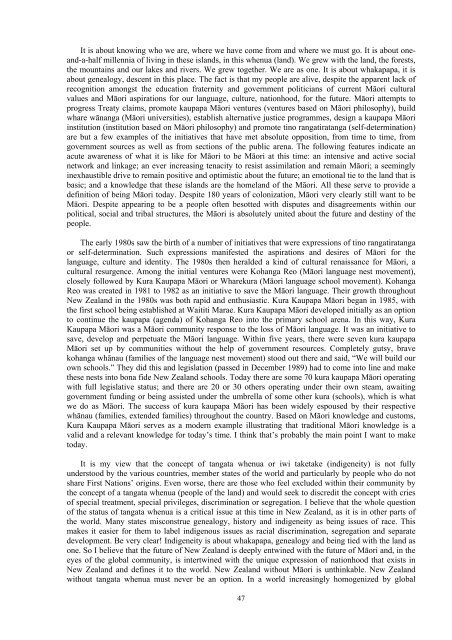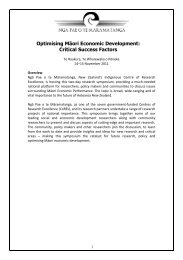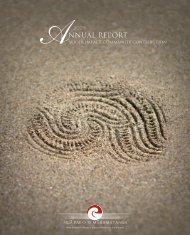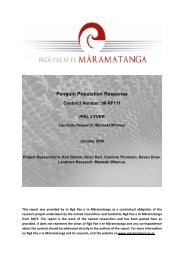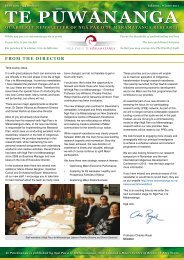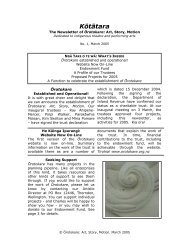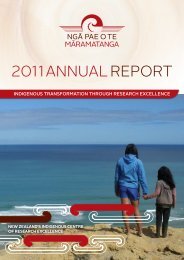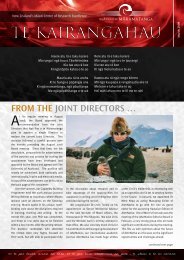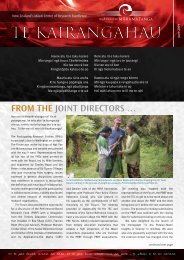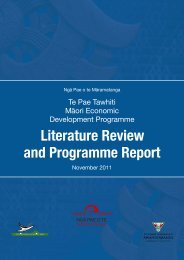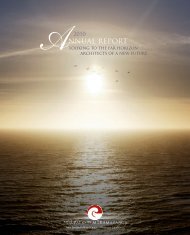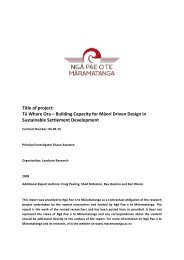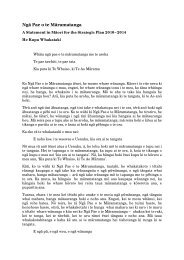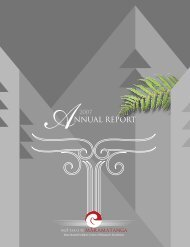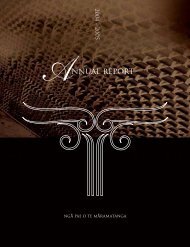traditional knowledge conference 2008 te tatau pounamu
traditional knowledge conference 2008 te tatau pounamu
traditional knowledge conference 2008 te tatau pounamu
You also want an ePaper? Increase the reach of your titles
YUMPU automatically turns print PDFs into web optimized ePapers that Google loves.
It is about knowing who we are, where we have come from and where we must go. It is about oneand-a-halfmillennia of living in these islands, in this whenua (land). We grew with the land, the forests,the mountains and our lakes and rivers. We grew together. We are as one. It is about whakapapa, it isabout genealogy, descent in this place. The fact is that my people are alive, despi<strong>te</strong> the apparent lack ofrecognition amongst the education fra<strong>te</strong>rnity and government politicians of current Māori culturalvalues and Māori aspirations for our language, culture, nationhood, for the future. Māori at<strong>te</strong>mpts toprogress Treaty claims, promo<strong>te</strong> kaupapa Māori ventures (ventures based on Māori philosophy), buildwhare wānanga (Māori universities), establish al<strong>te</strong>rnative justice programmes, design a kaupapa Māoriinstitution (institution based on Māori philosophy) and promo<strong>te</strong> tino rangatiratanga (self-de<strong>te</strong>rmination)are but a few examples of the initiatives that have met absolu<strong>te</strong> opposition, from time to time, fromgovernment sources as well as from sections of the public arena. The following features indica<strong>te</strong> anacu<strong>te</strong> awareness of what it is like for Māori to be Māori at this time: an in<strong>te</strong>nsive and active socialnetwork and linkage; an ever increasing <strong>te</strong>nacity to resist assimilation and remain Māori; a seeminglyinexhaustible drive to remain positive and optimistic about the future; an emotional tie to the land that isbasic; and a <strong>knowledge</strong> that these islands are the homeland of the Māori. All these serve to provide adefinition of being Māori today. Despi<strong>te</strong> 180 years of colonization, Māori very clearly still want to beMāori. Despi<strong>te</strong> appearing to be a people of<strong>te</strong>n besot<strong>te</strong>d with dispu<strong>te</strong>s and disagreements within ourpolitical, social and tribal structures, the Māori is absolu<strong>te</strong>ly uni<strong>te</strong>d about the future and destiny of thepeople.The early 1980s saw the birth of a number of initiatives that were expressions of tino rangatiratangaor self-de<strong>te</strong>rmination. Such expressions manifes<strong>te</strong>d the aspirations and desires of Māori for thelanguage, culture and identity. The 1980s then heralded a kind of cultural renaissance for Māori, acultural resurgence. Among the initial ventures were Kohanga Reo (Māori language nest movement),closely followed by Kura Kaupapa Māori or Wharekura (Māori language school movement). KohangaReo was crea<strong>te</strong>d in 1981 to 1982 as an initiative to save the Māori language. Their growth throughoutNew Zealand in the 1980s was both rapid and enthusiastic. Kura Kaupapa Māori began in 1985, withthe first school being established at Waititi Marae. Kura Kaupapa Māori developed initially as an optionto continue the kaupapa (agenda) of Kohanga Reo into the primary school arena. In this way, KuraKaupapa Māori was a Māori community response to the loss of Māori language. It was an initiative tosave, develop and perpetua<strong>te</strong> the Māori language. Within five years, there were seven kura kaupapaMāori set up by communities without the help of government resources. Comple<strong>te</strong>ly gutsy, bravekohanga whānau (families of the language nest movement) stood out there and said, “We will build ourown schools.” They did this and legislation (passed in December 1989) had to come into line and makethese nests into bona fide New Zealand schools. Today there are some 70 kura kaupapa Māori operatingwith full legislative status; and there are 20 or 30 others operating under their own s<strong>te</strong>am, awaitinggovernment funding or being assis<strong>te</strong>d under the umbrella of some other kura (schools), which is whatwe do as Māori. The success of kura kaupapa Māori has been widely espoused by their respectivewhānau (families, ex<strong>te</strong>nded families) throughout the country. Based on Māori <strong>knowledge</strong> and customs,Kura Kaupapa Māori serves as a modern example illustrating that <strong>traditional</strong> Māori <strong>knowledge</strong> is avalid and a relevant <strong>knowledge</strong> for today’s time. I think that’s probably the main point I want to maketoday.It is my view that the concept of tangata whenua or iwi taketake (indigeneity) is not fullyunderstood by the various countries, member sta<strong>te</strong>s of the world and particularly by people who do notshare First Nations’ origins. Even worse, there are those who feel excluded within their community bythe concept of a tangata whenua (people of the land) and would seek to discredit the concept with criesof special treatment, special privileges, discrimination or segregation. I believe that the whole questionof the status of tangata whenua is a critical issue at this time in New Zealand, as it is in other parts ofthe world. Many sta<strong>te</strong>s misconstrue genealogy, history and indigeneity as being issues of race. Thismakes it easier for them to label indigenous issues as racial discrimination, segregation and separa<strong>te</strong>development. Be very clear! Indigeneity is about whakapapa, genealogy and being tied with the land asone. So I believe that the future of New Zealand is deeply entwined with the future of Māori and, in theeyes of the global community, is in<strong>te</strong>rtwined with the unique expression of nationhood that exists inNew Zealand and defines it to the world. New Zealand without Māori is unthinkable. New Zealandwithout tangata whenua must never be an option. In a world increasingly homogenized by global47


